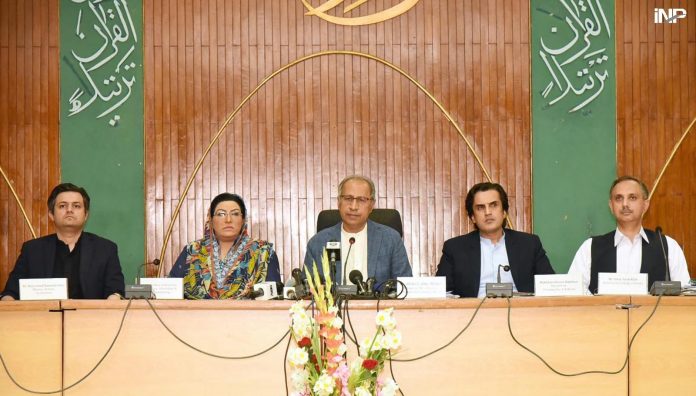–PM’s finance adviser says can’t make details of bailout agreement public before IMF’s formal approval
–Says IMF to take 3.2pc interest on $6bn loan, ‘going to IMF would send a good signal to international community’
ISLAMABAD: Prime Minister’s Adviser on Finance Abdul Hafeez Shaikh on Saturday said that the government had set the revenue collection target of Rs5.5 trillion for the next financial year.
Addressing a press conference here, Shaikh said that in order to collect the additional revenue, more people and companies would be brought into the tax net, however no extra burden would be put on those who were already paying taxes. He added that the government was taking measures to put more burden on tax evaders.
“Shabbar Zaidi, the new chairman of the Federal Board of Revenue (FBR), is quite an able and hardworking person and we hope he will meet the challenge of an ambitious target,” the PM’s adviser said.
Shaikh said that currently 360 companies were paying 85% of the total revenue of the country, while there are thousands of other companies who were not paying any taxes. “In order to bring people in the tax system, the government would utilise the data of gas, electricity consumers, bank account holders and companies registered with the Securities and Exchange Commission of Pakistan (SECP),” he added.
The adviser pointed out that there were as many as 341,000 commercial consumers out of which only 40,000 were registered with FBR. “Similarly, out of the total 50 million bank accounts, only 10% were registered with FBR,” he said.
IMF PACKAGE:
Defending the government’s deal with the International Monetary Fund (IMF), Shaikh said that the current deal with the Fund has a lower rate of interest as compared to other programmes.
The government has come under severe criticism from all quarters, including heated debates on mainstream media.
Defending the decision to enter into a deal with the IMF, Shaikh said the Fund was formed with the sole purpose of providing assistance to its member countries, which face “financial difficulties”.
“It is not a new thing and many countries have availed the facility as have we in the past many times,” he added.
The adviser said under the programme, the Fund will provide $6 billion to Pakistan over a period of three years. He said the programme was better than the previous bailout in a way that it was lower interest rates.
“The interest rate is 3.2 per cent,” he said.
He, however, refused to disclose the details of the package, saying the agreement will only be made public after the approval from IMF’s executive board.
He further defended the programme, saying going to the IMF would send a “good signal” to the international community about Pakistan’s commitment towards making the economy better in a disciplined manner.
After the IMF, others too will find incentive to form alliances and partnerships with us, the adviser said.
Shaikh said that the Pakistan Stock Exchange is performing well with every passing day and in the coming budget every institution will launch a cost-cutting campaign.
“The civilian and army administration are on the same page for this campaign,” he added.
ASSET DECLARATION SCHEME:
Speaking on the amnesty scheme approved by the federal government, the adviser said as far as the asset scheme goes, the government has made things easier for the people and any Pakistani national anywhere in the world can benefit from it. The rate is only 4 per cent, he added.
“If it is cash [you wish to declare] then you will have to show the money in the bank. And if it is real estate, then according to the approximate market value and [tax] payment at 1.5 per cent, you can have it [the property] ‘whitened’.
On May 15, the Pakistan Tehreek-e-Insaf (PTI) government approved the Asset Declaration Scheme after weeks of scrutiny amid internal opposition in a bid to “document the economy and to bring dead assets into the economy and make them functional”.
At the time, Shaikh said the “basic purpose” of the scheme was not to generate revenue — as media reports had speculated — but to bring dead assets into the economy and make them functional.




